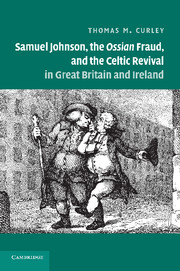Book contents
- Frontmatter
- Contents
- Prefatory acknowledgments
- 1 An introductory survey of scholarship on Ossian: why literary truth matters
- 2 James Macpherson's violation of literary truth
- 3 Johnson on truth, frauds, and folklore: in the company of Thomas Percy
- 4 Searching for truth in the Highlands: Macpherson throws down the gauntlet
- 5 Charles O'Conor and the Celtic Revival in Ireland
- 6 Johnson and the Irish: more opposition to Ossian
- 7 Johnson's last word on Ossian with William Shaw: a finale to controversy
- Appendix A A Reply to Mr. Clark's Answer
- Notes
- Bibliography
- Index
6 - Johnson and the Irish: more opposition to Ossian
Published online by Cambridge University Press: 30 July 2009
- Frontmatter
- Contents
- Prefatory acknowledgments
- 1 An introductory survey of scholarship on Ossian: why literary truth matters
- 2 James Macpherson's violation of literary truth
- 3 Johnson on truth, frauds, and folklore: in the company of Thomas Percy
- 4 Searching for truth in the Highlands: Macpherson throws down the gauntlet
- 5 Charles O'Conor and the Celtic Revival in Ireland
- 6 Johnson and the Irish: more opposition to Ossian
- 7 Johnson's last word on Ossian with William Shaw: a finale to controversy
- Appendix A A Reply to Mr. Clark's Answer
- Notes
- Bibliography
- Index
Summary
The Irish people are alike strangers to the glory that is reflected from the ancient celebrity of their country, and to all the generous sympathies that flow from such a revelation. How powerfully Doctor Johnson felt the importance of this too long neglected inquiry is evidenced by his correspondence with Charles O'Conor. “I have long wished,” writes this profound thinker, “that the Irish literature were cultivated.”
John Dalton, “The Social and Political State of the People of Ireland” (1830)Ireland can take justifiable pride in being first and foremost among nations to recognize Johnson's literary genius through the granting of its highest academic degree. The now-clichéd title of “Doctor” Johnson did not exist until Trinity College bestowed on him its doctorate in canon and civil law on 8 July 1765 in honor of the matchless elegance and usefulness of his writings (“ob egregiam scriptorum elegantiam et utilitatem”). That Ireland should have bestowed the first of his two honorary doctorates was singularly appropriate, not only because of his fame as a moralist-lexicographer praised in the document, but also in light of his less celebrated advocacy of Irish studies. Of the seven signatories listed on the totally unexpected diploma, only Dr. Francis Andrews and Rev. Thomas Leland seem to have had any claim to Johnson's notice. As the kindly provost of Trinity College, Andrews could count on solid Irish parliamentary support for funding professorships in Greek and mathematics, underwriting the addition of fellows and a chair of modern history, and beautifying the grounds with a building program resulting in the university's imposing west front facing College Green today.
- Type
- Chapter
- Information
- Samuel Johnson, the Ossian Fraud, and the Celtic Revival in Great Britain and Ireland , pp. 156 - 190Publisher: Cambridge University PressPrint publication year: 2009



